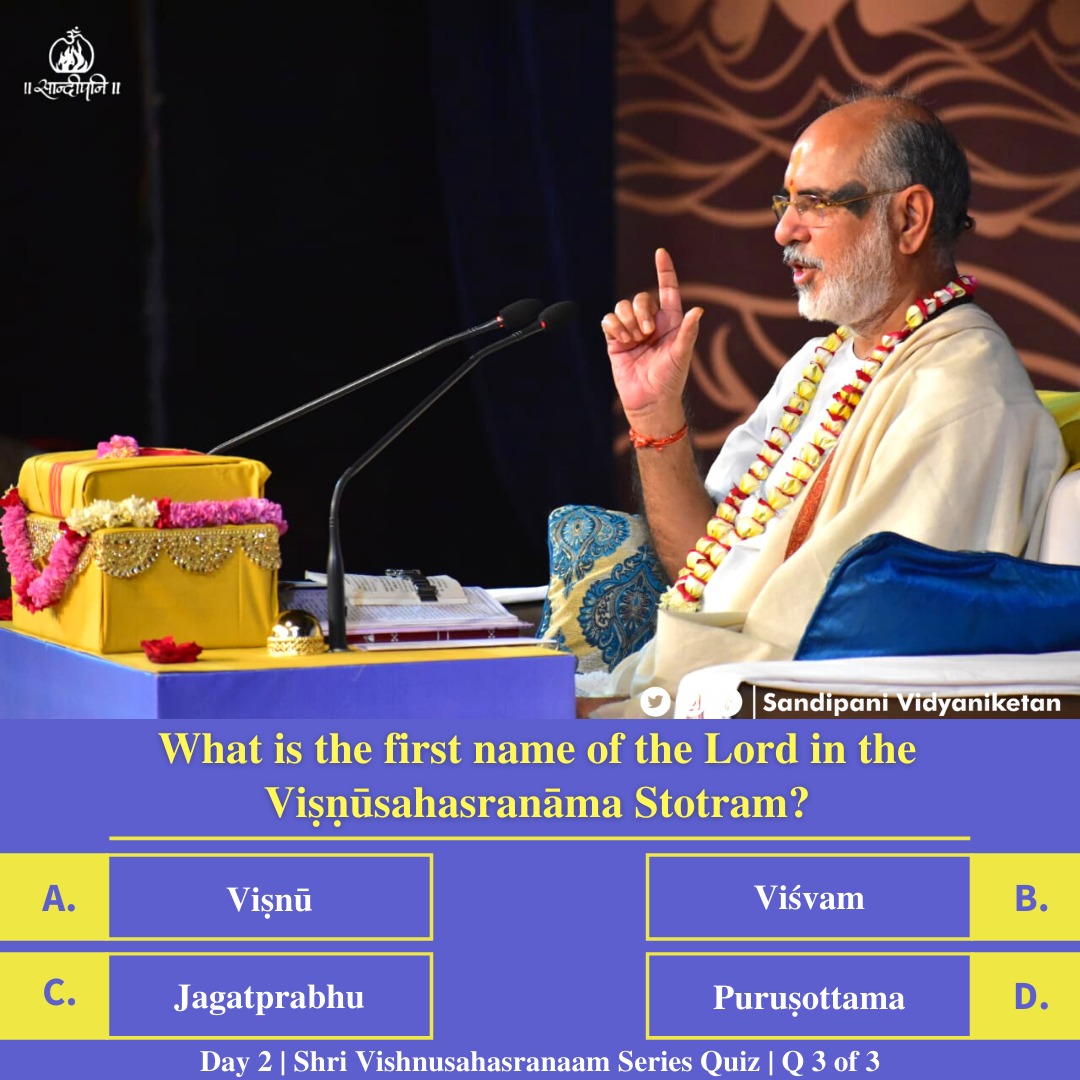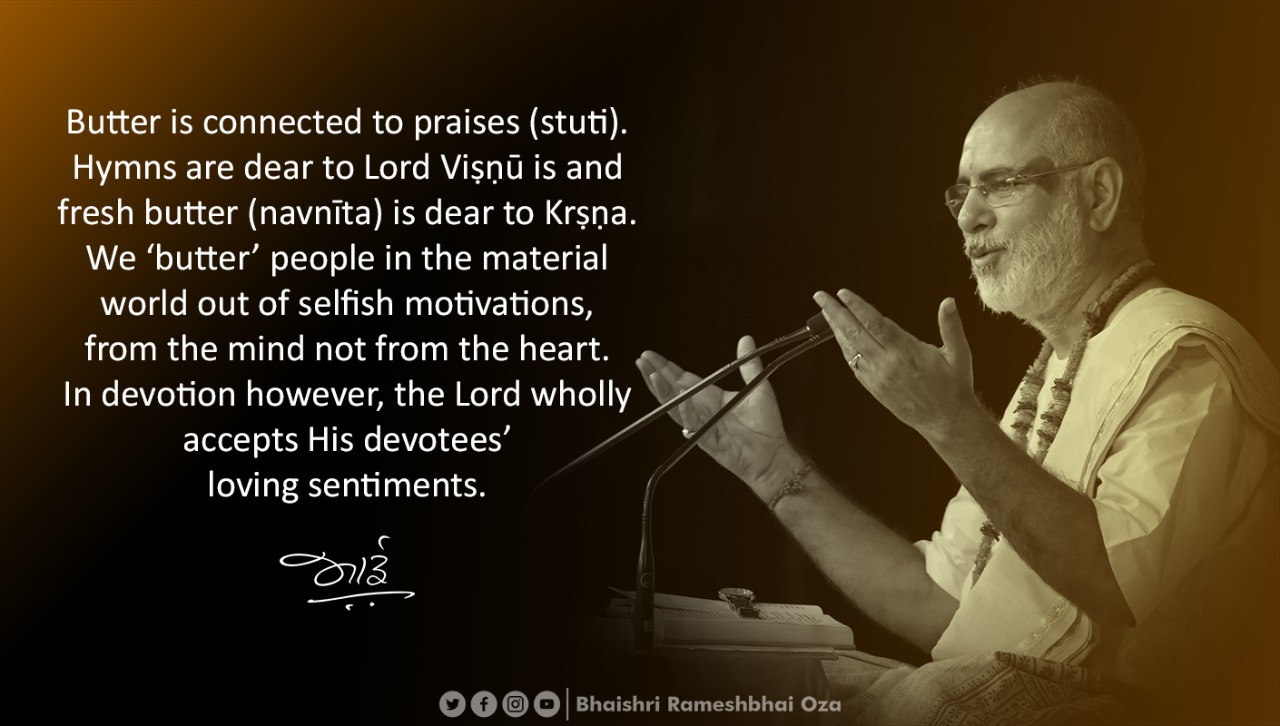Garland of Talks – The Nature of God’s World (Vishvam)

On the second day of the eleven-day ‘Śrī Viṣṇu Sahasranāma Stotram’ lecture series, the primary topics discussed by Pujya Bhaishri were the the nature of God’s Name; the nature of this world (vishvam); and the nature of God’s love for us.
The Nature of God’s Name
The Lord’s Name is the essence of all scriptures (sāra); the simplest of all methods (sarala); easily and equally accessible to all without discrimination (sulabha); delightful to chant (sukhada) and absolutely independent (svatantra). Verily a wish-fulfilling tree, each Name is complete and completely competent within itself to grant the desires of an aspirant. The Name is also able to correct itself if pronounced incorrectly- all that is needed is constancy!
These specialities of the Lord’s Name make it the perfect means for emancipation in all ages but moreover in this age of Kāli where it is said ‘Kaliyuga kevala nāmādhārā.’
A storehouse of contradictions
These many names of the Lord are based upon the qualities (guṇa) of the Lord who is simultaneously both a storehouse of all qualities (ananta-guṇa-nilaya) whilst being beyond all qualities or any attributes (guṇātīta). The Lord is the refuge of all apparent contradictions or opposing dharmas (natures) and so He is called ‘viruddha dharmāśraya’ and this is His supremacy.
Just as the Lord possesses the prowess to do as He wishes, so too do each and everyone of the Lord’s Name possess the infinite power and infinite grace to wipe out our indestructible sins and their resulting sorrows. Just as Lord Rāma may choose to shower His grace, so too may His Name! They are free of any form of dependence.
Why chant this collection of Names?
It is said that ‘even a fool does not commence an undertaking without first having a purpose!’ Of the many benedictions of chanting this powerful Stotram of a thousand Names, Pujya Bhaishri highlighted the need of the day- ‘freedom from fear(s) and diseases.’
‘rogārto mucyate rogādbaddho mucyeta bandhanāt । bhayānmucyeta bhītastu mucyetāpanna āpadaḥ ॥’
‘He will be free from all fears and be endowed with great courage and energy and he will be free from diseases.’
Traditionally, the significance and merits (‘Māhātmyam’) of every subject and scripture should be understood for a fruitful outcome of a discussion upon it. The many benefits of the Viṣṇusahasranāma Stotram are given within its conclusion (phalaśruti). The phalashruti (fruit) of the Stotram is in fact its Mahatmya (importance)- it frees one of all fear of Death.
The desire to learn (jigyasā) that leads to its revelation is by none other than Dharmarāja Yuddhiṣtira and it is spoken by the great Bhīṣmapitāmaha.
Viṣṇu- the answer to all of Yuddhiṣtira’s Six Questions placed to Bhīṣma
Muni Vaiśampāyana is narrating this exchange to King Janmajeya wherein it is asked-
1.Who is the greatest divine entity or ‘Dev Tattva’, in this world?
2.Who is most worthy of surrendering to and seeking refuge in?
3.Who is worthy of praising (via stuti as an external expression of worship)? By singing the praises of whom does mankind benefit?
4.By offering prayers who is worthy of veneration (as an expression of internal worship)?
5.Which is the most excellent amongst all forms of Dharma?
6.Which chant (japa) liberates all living beings from the bondage of rebirth entailing life and death?
Pujya Bhaishri quoted the sentiment conveyed in this famous verse by Mahāprabhu Vallabhācharya ji, wherein he expresses his loyalty (ananyatā) with a singular answer to these varied questions-
Ekam śāstram devakī putra gītam Eko devo devakīputra Eva;
Eko mantrasya nāmāni yāni Karmāpyekam tasya devasya sevā.
The only scripture is the song of Devaki’s son’s (Lord Krṣṇa); The only God is Devaki’s son (Lord Krṣṇa);
The only Mantra is the Lord’s Name;
The only action (Karma) is service to this Supreme Lord.
Is a Stuti Praise or Flattery?
Genuine praise of another spoken with love and sincerity without any trace of selfishness or fear is called ‘Stuti’.

The Lord who is worshipped here is one who frees us of all fears including the fear of Death. In fact, all desires of an individual can only be fully satiated by the Lord. Even if filled with fear or desires of the material world, approach the Lord before who understands your unspoken needs.
Thus, whatever praise you offer in worship shall be genuine as the Gopis have attested ‘praṇata-dehināṁ pāpa-karṣaṇaṁ‘. In contrast, if we praise a materialist out of fear or need, no one can ever fully satisfy us.
Lord Vishnu is ‘Stuti Priyo’ and Lord Krishna is ‘Navneet Priya’. Offer your love along with your praise and it shall be a sugar coated ball of butter that the Lord is eager to accept.
The true nature of ‘Viśvam’
If someone says they can place their faith in a visible form of the Lord; then the very first name of the Lord is “Vishvam” indicating that this entire world is nothing but a manifestation of the Lord Himself. All of existence, individual or cosmic, is nothing but Yagya.
Pujya Bhaishri revealed the essential nature of this world through the teachings of both Adi Śankarācarya (Brahm Satyam Jagan Mithya) who sees the world as an apparent, not actual, reality and Shri Vallabhācārya who views the world as a blissful part of the ever- blissful Lord.
The potency of the ‘reality’ of this world is because its cause and source of sustenance is the Lord, who is Supreme Truth (i.e. that which exists at all times).
The nature of God’s love is seen in His smile
Vallabhacharya has distinguished between the false material world (sansāra) and the ‘Jagat’ which is a portion of the blissful-Lord.
When you pass by a flower in bloom, give it your attention and feel delighted to know the flower is in fact the Lord’s smiling greeting as he sees you pass by! With this perspective the entire universe is in fact blissful!
The name ‘Puśpa-hāsa’ means the Lord’s smile is a beautiful flower in bloom, thus every flower in bloom is in fact the Lord’s smile! This is one of Pujya Bhaishri’s personal favorite names of the Lord! Similarly, the name ‘Pundarīkāksha’ refers to the lotus-eyed Lord whose eyes possess the qualities of beauty and detachment of the lotus. View the Vishvam with these eyes!
‘Sarva Loka Maheshwara‘ is a name of the ‘Lord of the World’ that is often quoted by Shri Gunvant Shah in his literature.
The nature of Divine Sound
This Stotram commences with OM, that Supreme Brahman in divine sound. There is no need to seek any further meaning to it; yet within it are many meanings as sound (nāda) is not without meaning (nirarthak). The nature of this pranava is manifold! With the correct chanting of this OM pranava mantra, various forms of breath exercises (bhrastrika, bhramari etc) happen effortlessly.
When Male sperm swim towards an ovum for fertilisation it has a tail behind which is what gives it momentum. Similarly, the reverberating humming that follows the chanting of OM is vital to its chant. Hindu Temples are constructed such that this divine sound vibrates throughout the structure and within you. Each of the five elements of material creation and all words, music, languages and substance have its own vibrational pattern because they all emerge from OM! Harih Om.
•Program begins with a brief English summary daily by Shri Vibhootiben, Shri Bhavyangbhai Acharya (exclusively for ZOOM viewers);
•Followed by chanting of the Stotram by Shri Shyambhai Thakar for purification of mind and pronunciation and thereafter
•by Pujya Bhaishri’s lecture https://bit.ly/VSNPravachanSeries
•Test your knowledge of this series with our Quiz Series https://bit.ly/VSNQuiz
•Download the entire PDF in Sanskrit and English now
•Day 2 – Śrī Viṣṇusahasranāma Pravachan by Pujya Bhaishri at Sandipani Vidyaniketan (Porbandar) 27.11.2020
Report by Nimisha Sadhu and Shivani Suchak